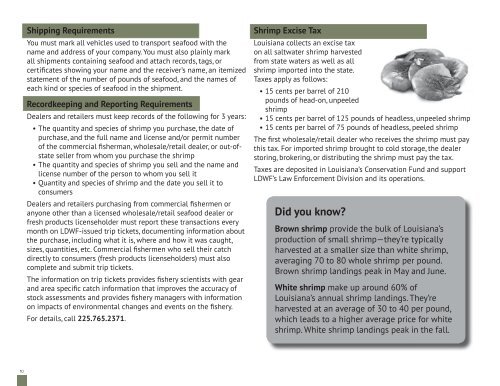Create successful ePaper yourself
Turn your PDF publications into a flip-book with our unique Google optimized e-Paper software.
Shipping Requirements<br />
You must mark all vehicles used to transport seafood with the<br />
name and address of your company. You must also plainly mark<br />
all shipments containing seafood and attach records, tags, or<br />
certificates showing your name and the receiver’s name, an itemized<br />
statement of the number of pounds of seafood, and the names of<br />
each kind or species of seafood in the shipment.<br />
Recordkeeping and Reporting Requirements<br />
Dealers and retailers must keep records of the following for 3 years:<br />
• The quantity and species of <strong>shrimp</strong> you purchase, the date of<br />
purchase, and the full name and license and/or permit number<br />
of the commercial fisherman, wholesale/retail dealer, or out-ofstate<br />
seller from whom you purchase the <strong>shrimp</strong><br />
• The quantity and species of <strong>shrimp</strong> you sell and the name and<br />
license number of the person to whom you sell it<br />
• Quantity and species of <strong>shrimp</strong> and the date you sell it to<br />
consumers<br />
Dealers and retailers purchasing from commercial fishermen or<br />
anyone other than a licensed wholesale/retail seafood dealer or<br />
fresh products licenseholder must report these transactions every<br />
month on LDWF-issued trip tickets, documenting information about<br />
the purchase, including what it is, where and how it was caught,<br />
sizes, quantities, etc. Commercial fishermen who sell their catch<br />
directly to consumers (fresh products licenseholders) must also<br />
complete and submit trip tickets.<br />
The information on trip tickets provides fishery scientists with gear<br />
and area specific catch information that improves the accuracy of<br />
stock assessments and provides fishery managers with information<br />
on impacts of environmental changes and events on the fishery.<br />
For details, call 225.765.2371.<br />
Shrimp Excise Tax<br />
Louisiana collects an excise tax<br />
on all saltwater <strong>shrimp</strong> harvested<br />
from state waters as well as all<br />
<strong>shrimp</strong> imported into the state.<br />
Taxes apply as follows:<br />
• 15 cents per barrel of 210<br />
pounds of head-on, unpeeled<br />
<strong>shrimp</strong><br />
• 15 cents per barrel of 125 pounds of headless, unpeeled <strong>shrimp</strong><br />
• 15 cents per barrel of 75 pounds of headless, peeled <strong>shrimp</strong><br />
The first wholesale/retail dealer who receives the <strong>shrimp</strong> must pay<br />
this tax. For imported <strong>shrimp</strong> brought to cold storage, the dealer<br />
storing, brokering, or distributing the <strong>shrimp</strong> must pay the tax.<br />
Taxes are deposited in Louisiana’s Conservation Fund and support<br />
LDWF’s Law Enforcement Division and its operations.<br />
Did you know?<br />
Brown <strong>shrimp</strong> provide the bulk of Louisiana’s<br />
production of small <strong>shrimp</strong>—they’re typically<br />
harvested at a smaller size than white <strong>shrimp</strong>,<br />
averaging 70 to 80 whole <strong>shrimp</strong> per pound.<br />
Brown <strong>shrimp</strong> landings peak in May and June.<br />
White <strong>shrimp</strong> make up around 60% of<br />
Louisiana’s annual <strong>shrimp</strong> landings. They’re<br />
harvested at an average of 30 to 40 per pound,<br />
which leads to a higher average price for white<br />
<strong>shrimp</strong>. White <strong>shrimp</strong> landings peak in the fall.<br />
10


